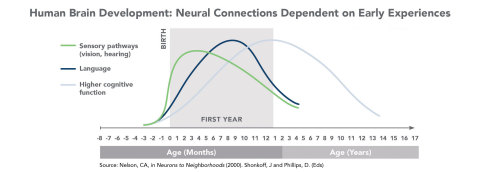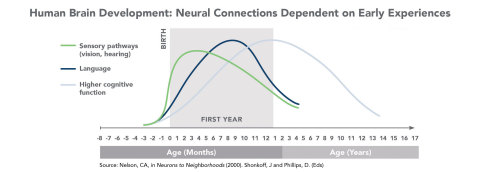MINNEAPOLIS--(BUSINESS WIRE)--The Itasca Project, a cross-sector alliance of Minneapolis-St. Paul-area employers, released its latest report, First 1000 Days: Invest When it Matters Most, amidst a global pandemic that has exposed systemic challenges for working families with young children. Beyond the significant strain on employers and families, COVID-19 creates an opportunity to think differently about employers’ role in promoting practices and policies that support optimal early experiences for children in the first 1,000 days, according to the report.
Extensive neuroscience research shows early experiences (e.g., nutrition, healthcare, caregiving, environmental safety), prenatal to age 3, build the foundation, or neural connections, for all future learning, behavior and health. Once neural connections in the brain are set — and 80% of the brain develops by age 3 — the brain architecture is challenging and expensive to change, as the brain is most plastic during this time. In Minnesota, 75% of babies are born to mothers who work, meaning employers of all sizes have a pivotal role to play in influencing early experiences for optimal brain development.
“The future prosperity of our region depends on our ability to foster the health and well-being of the next generation,” said Andrea Walsh, president and CEO of HealthPartners and a co-chair of the First 1000 Days task force. “Employers play a big role in supporting families and children. We want to collectively raise awareness about the critical importance of early childhood development and implement family-friendly practices to support babies and our youngest children.”
Through the First 1000 Days work, the Itasca Project is joining Little Moments Count, a Minnesota-based statewide movement to help parents, caregivers and the community understand the importance of talking, playing, reading and singing with infants and toddlers given the impact on brain development. Little Moments Count is a cross-sector collaborative of organizations focused on reaching parents across cultural communities with an aim to increase equity. The Itasca Project will lead the movement’s employer-focused engagement efforts.
The Minneapolis-St. Paul region has more than 100,000 families with children under 3 years old. Each year, 34,000 babies are born in the seven-county metro area; one-third of those babies are at some risk for unhealthy development. The Itasca Project seeks to increase economic competitiveness of the region and expand prosperity for all, and the report positions healthy early childhood development as one of the greatest opportunities to promote inclusive economic growth.
“More than a decade ago, Minnesota business leaders sparked a national dialogue around the economic impact of early childhood investment,” said Tim Welsh, vice chair, consumer and business banking at U.S. Bancorp and a First 1000 Days task force co-chair. “While we still need to better fund and increase access to quality childcare, the latest research demands we start sooner, particularly if we want to increase equity given the impact of adverse childhood experiences on brain development.”
Making the most of the first 1,000 days
The Itasca Project report defined four major factors in optimal brain development during the first 1,000 days that offer opportunities for intervention: health and wellness, knowledge and skills, community resources and support and social determinants of health.
- Health and wellness: Ensure all families have access to prenatal care, increase pregnant mother and infant nutrition, create conditions that encourage breastfeeding and expand support for family mental and emotional health.
- Knowledge and skills: Provide parent education and training, deploy electronic communication to reinforce good habits and expand home visits and support.
- Community resources and support: Increase available higher-quality childcare and funding for childcare scholarships and subsidies to expand affordability; elevate early childhood education ecosystem through partnerships with the University of Minnesota Masonic Institute for the Developing Brain, which plans to open its doors in fall 2021.
- Social determinants of health: Create jobs with family-sustaining wages, expand job training and placement for workers with low income, expand low-cost housing, ensure healthy food supply and encourage family-friendly practices in the workplace.
"It's not just ‘doing the right thing’ for our children. It's doing the best thing for all of us,” said University of Minnesota Medical School Dean Jakub Tolar, MD, PhD and task force co-chair. “For the first time since 1918, we have seen average U.S. life expectancy go down for four consecutive years. Not only is our lifespan shortening, our healthspan is as well. Suboptimal brain development can lead to preventable disorders like addiction, depression and obesity. Here in Minnesota, we have it within our power to ensure a better lifetime of brain health. By intervening in the first 1,000 days of life, we can make an impact on each child's potential for a happy, successful future. That's good for all of us."
About the First 1000 Days Report
In October 2019, the Itasca Project convened a small task force of members to better understand the latest science of brain development during the first 1,000 days. As part of this effort, we investigated the challenges the families with young children face during this critical period, particularly our most vulnerable families. The aim of this resulting report is to help increase awareness of the critical and lifelong impact of the first 1,000 days to a child’s future given our vested interest in their success.
About the Itasca Project
The Itasca Project is an employer-led alliance drawn together by an interest in new and better ways to address regional issues that impact our future economic competitiveness and quality of life in the Minneapolis-St. Paul region. Its 70-plus participants are primarily private-sector CEOs, public-sector leaders and the leaders of major foundations based in the region. To learn more, visit theitascaproject.com.




